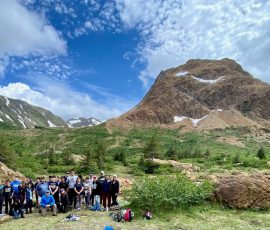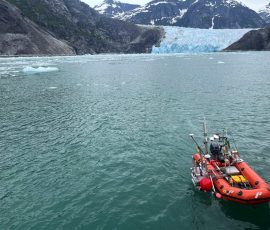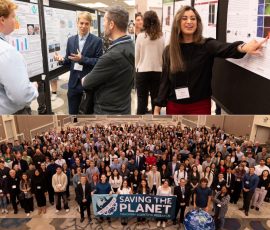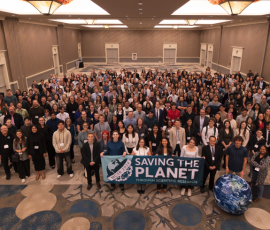Find the full report here.
Watch the September 10 DeVos Institute of Arts Management presentation on this research here.
September 10, 2020
FOR IMMEDIATE RELEASE
DeVos Institute of Arts Management Publishes In-Depth Study on Ecology of Portland Arts
Research project investigates challenges facing Rose City’s arts organizations, identifies strategies for success moving forward
(Portland, OR) – The DeVos Institute of Arts Management at the University of Maryland today released the final report from an in-depth research project examining the current arts ecosystem in the Portland/Vancouver Metro Area.
“The Portland/Vancouver Metro Area is home to a vibrant arts community supported by a diverse, regional audience. However, the immediate challenges raised in 2020 by the COVID-19 pandemic and the desire to see a rapid evolution of management through an equity lens only add to the long-running discussions related to other chronic issues under discussion by leaders,” said Steve Moore, Executive Director, M.J. Murdock Charitable Trust.
“While we know that there is a wise path forward that will help strengthen our arts community and ensure access to diverse cultural programming for all, we want to ensure that approach is informed by hard data and real world feedback. We are grateful to be longtime partners with the DeVos Institute, and we were fortunate to have their partnership in this effort.”
The report compiles a wealth of data related to management of local arts organizations contrasted against groups from similar-sized metropolitan areas. Researchers also conducted dozens of interviews with local arts and community leaders to best understand where the Portland/Vancouver Metro Area arts community draws its strength and where opportunities exist for future growth. The collected data also helps shed light as to the role arts organizations play as economic engines within the region and their contributions to the broader health and success of the local economy.
“We have had the opportunity to work with a variety of arts organizations in the Rose City and across the Pacific Northwest over the last several years,” said Michael Kaiser, Chairman, DeVos Institute of Arts Management. “Studies like this help crystallize opportunities for collaboration and strategies for growth that support the full ecosystem. We were grateful to see arts leaders from a variety of backgrounds willing to lend their voices to this work and eager to continue engaging in a collaborative approach to serve and support the arts community.”
Key Findings
The full report is now available online (download here) and provides a robust overview of the Portland/Vancouver Metro Area’s arts community, how it has grown over time and what factors contribute to its success. Research began before the COVID-19 pandemic came to fruition, and while the unique challenges presented by social distancing guidelines are considered, the report takes a long-term view of the opportunities and challenges facing the sector.
Key findings of the report include:
- A magnet for growth, the Portland/Vancouver Metro Area has the potential to be a leader within the national arts community, buoyed by its growing economy, rapidly increasing young population base that actively seeks diverse experiences, an established cultural ethos and a grassroots, “can-do” spirit.
- While the Portland/Vancouver Metro Area is home to a collection of larger, renowned anchor organizations with decades of history and several smaller groups serving modern needs of niche audiences, the region is thinner when it comes to strong, mid-sized arts groups. Through strategies such as thoughtful merger of or collaboration by similarly minded small organizations, purposeful investment by donors and increased support from elected leaders, the city can achieve more balance in terms of the range of groups serving patrons.
- Residents in the Rose City love attending live performances and exhibitions and are quick to purchase tickets and admissions, yet additional financial donations are not as common as in similarly sized metropolitan areas. Researchers recommend a concerted effort to increase financial giving by donors to the city’s arts community to help strengthen and grow their capacity.
- The arts community cannot grow on its own. The study reveals that cultivating a task force of diverse voices can help identify and advance collective opportunities for success for multiple groups.
- An investment in the Rose City’s arts community is an investment in the region’s broader economy. Establishing Portland/Vancouver Area arts organizations on a national level helps generate tourism and additional income from regional visitors.
“The Portland/Vancouver Metro Area arts community has a long history of producing outstanding work and is well positioned for a long and bright future,” said Michael Kaiser. “That said, there are challenges that arise in the evolution of any nonprofit sector, and the arts are not immune. As the Rose City seeks to address a wide range of challenges related to population growth and evolving economics, continuing to thoughtfully invest in the arts must also remain a priority.”
The Latest Step in a Long Partnership
This report is the latest phase of a partnership between the DeVos Institute and the Portland/Vancouver Metro Area arts community.
For several years, the DeVos Institute has invested in building the capacity of arts organizations throughout the Rose City and across the Pacific Northwest with the support of a coalition of 14 nonprofit foundations and funders, including the Collins Foundation, Community Foundation for SW Washington, Harold & Arlene Schnitzer CARE Foundation, James F. & Marion L. Miller Foundation, M.J. Murdock Charitable Trust, Marie Lamfrom Charitable Foundation, Maybelle Clark MacDonald Fund, Meyer Memorial Trust, Robert D. and Marcia H. Randall Charitable Trust, The Ford Family Foundation and The Oregon Community Foundation.
“The leaders at the DeVos Institute have a long history of ‘digging in’ with local arts groups in our region to truly understand and support their needs from the ground up. They have successfully helped dozens of our arts organizations flourish and thrive in a variety of settings,” said Steve Moore. “We are grateful for their willingness to bring this expertise to our community and for their commitment to help serve and support nonprofits across the Rose City and the broader Pacific Northwest.”
About M. J. Murdock Charitable Trust
The Murdock Trust, created by the will of the late Melvin J. (Jack) Murdock, provides grants to organizations in five states of the Pacific Northwest—Alaska, Idaho, Montana, Oregon and Washington—that seek to strengthen the region’s educational, spiritual and cultural base in creative and sustainable ways. Since its inception in 1975, the Trust has awarded more than 7,000 grants totaling more than $1 billion. For more information, find the Murdock Trust on Twitter, Facebook, LinkedIn, Instagram and on our website.
About the DeVos Institute of Arts Management
The DeVos Institute of Arts Management at the University of Maryland, led by Michael M. Kaiser and Brett Egan, provides training, consultation and implementation support for arts managers and their boards.
It operates on the premise that while much is spent to train artists, too little is spent to support the managers and boards who keep those artists at work.
The DeVos Institute has designed its services to assist a wide range of institutions, from traditional performing and presenting organizations, museums, galleries, art schools and libraries, to botanical gardens, glass-making studios, public art trusts and nonprofit cinemas, to name a few.
The DeVos Institute has served more than 1,200 organizations from over 80 countries since its founding at the John F. Kennedy Center for the Performing Arts in 2001. In 2014, the DeVos Institute transferred its operations to the University of Maryland, maintaining offices in Washington D.C. and partnering with the University on research, teaching and fellowship initiatives serving thousands of students and practitioners worldwide.







